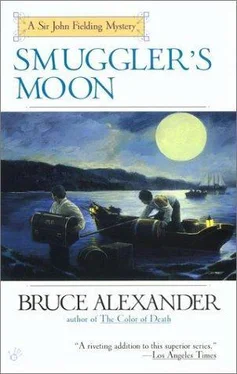Bruce Alexander - Smuggler's Moon
Здесь есть возможность читать онлайн «Bruce Alexander - Smuggler's Moon» весь текст электронной книги совершенно бесплатно (целиком полную версию без сокращений). В некоторых случаях можно слушать аудио, скачать через торрент в формате fb2 и присутствует краткое содержание. Жанр: Исторический детектив, на английском языке. Описание произведения, (предисловие) а так же отзывы посетителей доступны на портале библиотеки ЛибКат.
- Название:Smuggler's Moon
- Автор:
- Жанр:
- Год:неизвестен
- ISBN:нет данных
- Рейтинг книги:4 / 5. Голосов: 1
-
Избранное:Добавить в избранное
- Отзывы:
-
Ваша оценка:
- 80
- 1
- 2
- 3
- 4
- 5
Smuggler's Moon: краткое содержание, описание и аннотация
Предлагаем к чтению аннотацию, описание, краткое содержание или предисловие (зависит от того, что написал сам автор книги «Smuggler's Moon»). Если вы не нашли необходимую информацию о книге — напишите в комментариях, мы постараемся отыскать её.
Smuggler's Moon — читать онлайн бесплатно полную книгу (весь текст) целиком
Ниже представлен текст книги, разбитый по страницам. Система сохранения места последней прочитанной страницы, позволяет с удобством читать онлайн бесплатно книгу «Smuggler's Moon», без необходимости каждый раз заново искать на чём Вы остановились. Поставьте закладку, и сможете в любой момент перейти на страницу, на которой закончили чтение.
Интервал:
Закладка:
I had no difficulty finding Mick Crawly, nor in persuading him to take me up to the Grenville estate. Nevertheless, so troubled was I by what I had heard from Molly Sarton that even though I rode beside Mr. Crawly and listened to him talk excitedly of the events of the night before, I had little to say in response. I found myself troubled, too, by the easy way he talked of roadblocks, ambushes, and the like, for after all, Sir John had been insistent to Mr. Dickens on the need for secrecy. I decided to confront him with my misgivings.
“Mr. Crawly,” said I, ”surely Sir John impressed upon you the need for absolute secrecy in regard to all that happened last night.”
“Oh, he did, he did.”
“Earlier, Mr. Dickens gave his assurances that we could trust you not to betray our operations. But betrayal can certainly be unintentional-so I must ask you, sir, have you told anyone of what you saw and heard last night?”
The expression upon his face expressed something akin to horror. And it was real enough and not mere playacting-of that I was sure.
“I gave my word, young sir, and I would never, never break that. It’s just that …” He hesitated.
“Yes, what is it?” I prompted him. I would hear the worst.
“It’s just that, well, last night-that was proper excitement, that was. Why, it was just about the most exciting time I ever had. I was so worked up I couldn’t hardly go to sleep at all. I’ve been scarce thinkin’ of anything else since then, and here I’d sworn I wouldn’t say a thing about it. I was grateful when I seen you come along because I had somebody I could talk to about it. I was fair burstin’ to tell. Now I have. I’ll be all right now, I swear.”
“Just so long as you’re sure.”
“Oh, I am.”
We left it at that. Nevertheless, after traveling over a quarter of a mile in silence, Mr. Crawly resumed his excited discussion by asking me how many I had actually killed the night before. He seemed disappointed when I told him.
Lieutenant Tabor, however, took such matters in his stride. I found him without difficulty. Indeed, one could hardly miss the encampment of the King’s Carabineers, so near was it to the road leading past the distant manor house. His was the only tent in which one could actually stand to full height. By the time I reached him, he was dressed but unshaven; his servant was preparing to attend to it, stropping a razor, heating the water by the fire. The lieutenant read through the letter quickly and, it seemed to me, rather casually. Then, without a word, he tossed it into the open fire where the pot of water seethed. His indifferent attitude worried me a bit.
“I was to tell you to take note of the particulars which Sir John set forth in the letter, and then tell you to burn it,” said I to him. ”Since you’ve already done the latter, I trust I may tell him you’ve also attended to the former.”
“You may tell him what you like,” said he. ”I am certainly confident that I have mastered the ‘particulars,’ as you call them-time, place, et cetera -or I should not have burned the letter. Will there be anything else? Do you wish to insult my intelligence further?”
I held my tongue. There would be no good purpose in trading rudeness for rudeness, so I simply bowed to him most politely, wished him a good day, and departed.
For a bit, as I returned with Mr. Crawly to town, I mused upon the lieutenant’s attitude toward me. Why, he was quite as impolite as Lord Mansfield’s butler. Yet hadn’t he the day before been ever so much more obliging and mannerly? Ah yes, but the day before, I had but watched him and listened to his exchanges with Sir John and Mr. Eccles; he had had naught to say to me. He would seem then to be one-one of the many-who bowed and scraped to those he thought (or feared) might be his betters, and treated the rest with arrogant hostility. Mr. Patley had not a high opinion of the man. I now understood better the why of that.
I mentioned none of this to Sir John when I came back. There was no need, of course, but more important, he said that he had a task for me that was every bit as important as the one from which I had just returned. I was eager to hear of it.
“Do you wish me to wear pistols for this one, as well?” I asked him.
“What? Oh, no, certainly not necessary. Indeed, if you were to do so, it might create the wrong impression altogether.”
“Perhaps I should ask just what sort of task you have in mind for me.”
“Simple enough,” said Sir John. ”I wish you to go down to that sandy beach where you and Mr. Perkins and the two Deal constables prevented the landing by that crew of smugglers-I know not the name of it.”
“Goodwin Sands-or so I understand.”
“Very well, Goodwin Sands then. Where was I? Ah yes, I wish you to go down to that beach and look for Mr. Bilbo.”
This was indeed good news. ”Is he coming for a visit?”
“No, no, not the sort you mean. He’ll not be coming ashore at all, not even anchoring out there offshore.”
This was most puzzling. ”How then shall I see him? How can I know him?”
”Why, by the flag that he flies. You’ve noticed, I’m sure, Jeremy, that ships that ply the Channel hereabouts fly all manner of flags from their rigging and their masts?”
“Well, yes, I have, but I thought them more or less for decoration.”
“Nothing of the kind. The Union Jack, which you’ve no doubt seen, is flown for purposes of identification. It declares that this is a British ship. The orange ensign identifies the ship as Dutch, and the fleur de lys flag declares the ship as French. Ah, you say, but what about the rest of them-those small flags that flutter all round the rigging? You’ve seen those, too, haven’t you?”
“I have, yes, and wondered at them,” said I.
“Well,” said Sir John, ”they’re there as signals-to other ships or to those on the shore.”
“What do the signals say?”
“Whatever they might like them to say,” said he quite expansively. ”It would all be worked out in advance between those in the ship and those on the shore.”
“Now I begin to understand, sir. You and Mr. Bilbo have worked out a code between you, have you not? But how did you know when Mr. Bilbo would be here?”
“That was according to his estimate,” said Sir John. ”I could in no wise dictate to him the time of his arrival. He did say, however, that if all were ready he would sail by Deal morning and afternoon. There’s little of the morning left, but he’s a man of his word, and we must look for him during the rest of the day. I cannot see him, and so you must be my eyes in this. Do you recall the general look of his ship?”
“I do, yes,” said I. ”It’s called a sloop, is it not? I’ve seen others like it.”
“Very good. Now, what you must do, Jeremy, is to go out there to the beach and keep an eye open for Mr. Bilbo’s sloop. Now, as you’ve said, you’ve seen others like it. That is both good and bad, for while it should make it easier for you to recognize his as a sloop, it may make it possible for you to confuse his sloop with another. And so keep in mind that Mr. Bilbo’s ship is, as I understand, varnished in a lighter shade than most. Had you noticed that?”
“Now that you mention it, sir, I suppose I had. I remember it as a sort of golden brown.”
“That is no doubt correct,” said he, ”but another point to aid identification-he will be flying the Union Jack. And a third point, which is the most important, he will be flying green and white flags from his rigging. Have you got all that?”
“Yes, Sir John-lighter shade, Union Jack, green and white flags.”
“Right you are.” He gave a crisp nod of approval.
Читать дальшеИнтервал:
Закладка:
Похожие книги на «Smuggler's Moon»
Представляем Вашему вниманию похожие книги на «Smuggler's Moon» списком для выбора. Мы отобрали схожую по названию и смыслу литературу в надежде предоставить читателям больше вариантов отыскать новые, интересные, ещё непрочитанные произведения.
Обсуждение, отзывы о книге «Smuggler's Moon» и просто собственные мнения читателей. Оставьте ваши комментарии, напишите, что Вы думаете о произведении, его смысле или главных героях. Укажите что конкретно понравилось, а что нет, и почему Вы так считаете.












